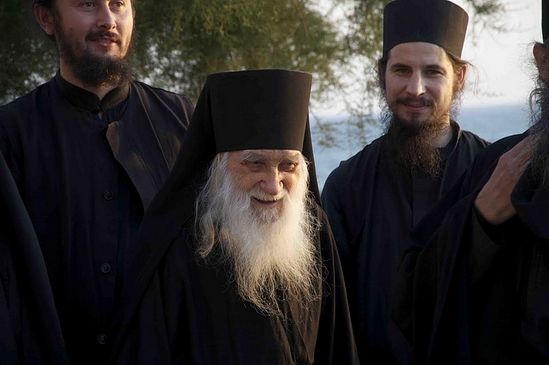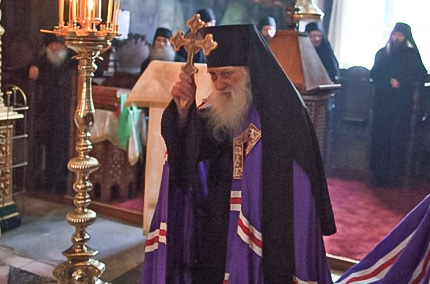Each of us is constantly faced with positive and negative events, actions and experiences on our life’s journey. At the same time, we often easily forget what is good and positive, as something that is taken for granted or is everyday, while we remember negative moments for a long time, feeding on them in our anger and hostility towards our offenders. Sometimes even years pass, but the old insults still do not leave us, tearing our hearts… One might think that this is a natural human trait, but how natural is it from a Christian point of view? What, in fact, should a person remember, going through difficult trials and tribulations that God often sends us on our life’s journey?
I was led to think about this by the recent conversation of the 99-year-old Shiarchimandrite Jeremiah (Alekhine) from the Russian Saint Panteleimon monastery on Mount Athos with a famous Russian emigre artist, which was recounted to me by the old man’s spiritual son, the monk Yermolaj (Chezhia). Few people know that behind the loving and cheerful smile that does not leave the face of Father Jeremiah, the bitterness of suffering and pain that he survived in the Soviet and German camps and in exile is actually hidden. Having a hundred years of life experience (he was born in Lugansk in 1915!) he had the opportunity to suffer many difficult trials and hardships, after which many would not be able to remain sane, not to become cruel and to preserve faith and love for neighbors.
His childhood took place during the years of godless revolution and civil war. As a boy, together with his entire family, he was exiled to Siberia by the Soviet authorities. Due to the extreme conditions and being without a roof over his head, his parents, brothers and sisters died there from hunger and cold before his eyes. From the once huge Cossack family of the Alekhines, by a miracle of God, he was the only one left alive. Having escaped from the camp, the future old man wandered for several years, trying to reach his native Ukraine on foot. Having taken a job in 1935 as an ordinary worker in a metallurgical factory in Mariupol, he did not want to renounce his faith and join the Communist Party, openly declaring that he was an Orthodox Christian. Because of this, he was repeatedly exposed to the danger of persecution and arrest. With the arrival of the Germans in 1941, he was forcibly deported to hard labor in Germany, where he ended up in a concentration camp. During four long years, the future elder again had the opportunity to face humiliation, hunger and inhuman living conditions.

It is surprising that, regardless of the suffering and sadness he experienced, he did not become cruel, preserving in his heart an unshakable faith in the Lord. And when he was released in 1945, when asked by a Soviet officer – what does he plan to do in the future? – he answered that he wanted to spend the rest of his life in serving the Lord. One can only imagine what the Soviet officer’s reaction was… It was only by a miracle of God that he escaped another arrest.
He did not feel like becoming a priest immediately after returning to his homeland. Because of this, he was forced to work in a bakery in Lugansk. During this period, the future elder faced many new temptations and even persecution for his faith, but none of it broke him. Moreover, a new wave of atheistic attack on religion under Khrushchev moved him to make the decision to finally leave the world and devote his life completely to the service of God.
Thus, at the age of 42 (in January 1957), Jakov Alekhin received monastic vows in Odessa under the name Jeremias, and then received the rank of priest. His journey to Mount Athos was not easy either. Having learned that in 1960 some of the monks from the Pskov-Pechersk Monastery will be sent to serve in the Russian Athos Monastery of St. Panteleimon, Father Jeremiah, on the advice of his priest – a former member of that Mount Athos family, Rev. Kukshe (Velichka, died 1964) of Odesa, also submits a corresponding request. But in those years it was extremely difficult to get to Mount Athos. For 14 years, Fr. Jeremiah waited for permission. And yet, despite all the difficulties, in 1974. Patriarch of Constantinople Dimitrios of six monks from the USSR chose him and issued him the appropriate permission to settle on Mount Athos. From that moment on, Fr. Jeremiah, who did not even dream of such a grace of God, continued his asceticism on Mount Athos, later becoming the abbot of the Russian family of Mount Athos.

Father Jeremiah is 99 years old today. For exactly 35 of those years, he was the abbot of the Russian Saint Panteleimon Monastery on Mount Athos. Regardless of such a status, the bachushka always remains simple in communication and everyday life, unselfish, ascetic, strict and demanding of himself, and at the same time very kind-hearted and full of love both in his relationship with his brothers and pilgrims, regardless of their social status and position. In one word – a monk. And most importantly, as it turned out, he thanks God for everything in his life and constantly prays for all people, especially for those who have caused him so much suffering and pain.
Thus, the old man Jeremiah (Alekhine) was visited in the St. Panteleimon monastery by his long-time friend – a famous Russian emigrant artist (whose name I deliberately do not mention), who, like Bachushka, tasted the bitter cup of suffering in Soviet and German concentration camps. A friendly conversation and mutual evocation of memories ensued…
One of the monks present began to question the guest about the painful days lived in the Soviet concentration camps. And the guest shared his troubles and pains, stressing that the people in the camp were worse than dogs, incredibly cruel and that they made fun of them… And then at that moment he added that Father Jeremiah could tell just as many horrors, because everyone went through the same thing there. And he turned to his father…
Father Jeremiah, after remaining silent for a while, answered somehow calmly and piously: “Yes, yes, I remember… I remember when my parents were killed, the commander of the camp called me, gave me three rubles for small expenses and advised me to escape at night . I ran away too. For three years I wandered, walking from village to village, and nowhere did people let me die of hunger or leave me without food, even if they risked it for me. God sent good people. I remember. Thank God for everything!”
The interlocutors felt a certain discomfort and in order to somehow move on to the next topic, the present monk asked the guest about the German concentration camps. The guest started talking about how it was even worse in the Nazi camps and that he still has a hard time restraining himself when meeting the Germans… He cannot forget all the humiliations they had to endure. And he adds that Father Jeremias can also tell what the inhuman conditions were there… Father paused again, smiled and as if he remembered something pleasant, answered: “Yes, yes, I remember… I remember German women who came every day and threw us bread through the barbed wire so that we wouldn’t die of hunger. Their bread was so delicious that I still remember its taste. Thank God for everything!”
Reflecting on what was said, I was amazed how the old man Jeremiah, having survived so much pain, suffering and difficulties, not only did not become cruel and did not lose his faith, but even after those difficult trials he remembers only what was good… He talks about that terrible events in your life with a smile, as if about something pleasant. And most importantly, he thanks God for everything.
In this, obviously, lies the spiritual secret of the old man Jeremiah. The secret of his inner feat and long life. Here lies the answer to the question of what we should remember after life’s difficult trials and tribulations, which God sends us… This is the recipe for spiritual healing and reconciliation of our society.
Sergey Shmely
Russian Athos

